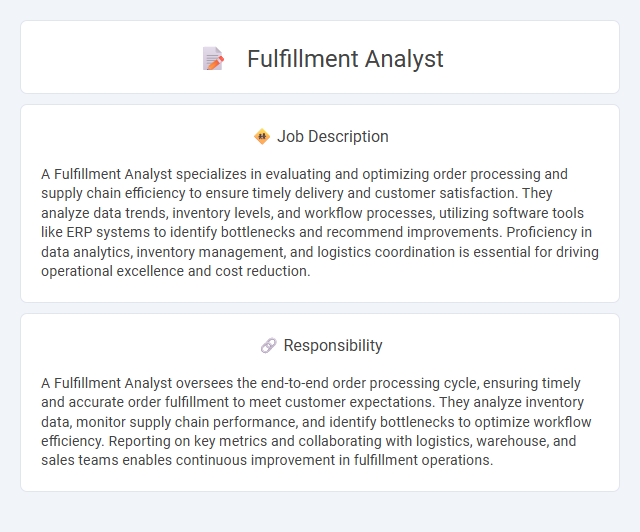
A Fulfillment Analyst specializes in evaluating and optimizing order processing and supply chain efficiency to ensure timely delivery and customer satisfaction. They analyze data trends, inventory levels, and workflow processes, utilizing software tools like ERP systems to identify bottlenecks and recommend improvements. Proficiency in data analytics, inventory management, and logistics coordination is essential for driving operational excellence and cost reduction.
Individuals with strong analytical skills and attention to detail are likely to be well-suited for a Fulfillment Analyst role, as the job involves managing data and optimizing logistics processes. Those who thrive in structured environments and possess effective problem-solving abilities may find the position aligns with their strengths. Candidates who prefer dynamic, fast-paced tasks and can handle repetitive data analysis might have a higher probability of success in this field.
Qualification
A Fulfillment Analyst requires strong analytical skills, proficiency in data analysis tools such as Excel, SQL, and business intelligence software, and experience with supply chain management or inventory systems. Candidates should possess a background in logistics, operations management, or a related field, along with excellent problem-solving abilities and attention to detail. Effective communication skills and the ability to interpret large datasets to optimize fulfillment processes are essential qualifications for this role.
Responsibility
A Fulfillment Analyst oversees the end-to-end order processing cycle, ensuring timely and accurate order fulfillment to meet customer expectations. They analyze inventory data, monitor supply chain performance, and identify bottlenecks to optimize workflow efficiency. Reporting on key metrics and collaborating with logistics, warehouse, and sales teams enables continuous improvement in fulfillment operations.
Benefit
A Fulfillment Analyst likely improves operational efficiency by analyzing and optimizing order processing workflows, which can result in faster delivery times and reduced costs. This role may enhance customer satisfaction through accurate inventory management and timely fulfillment predictions. Companies could see increased profitability and streamlined supply chain operations due to the insights provided by the analyst's data-driven recommendations.
Challenge
A Fulfillment Analyst likely faces the challenge of accurately interpreting complex data to optimize supply chain efficiency and reduce delivery times. There is a probability that balancing customer demands with inventory constraints could require innovative problem-solving skills. The role probably demands continuous adaptation to dynamic market trends and technology changes to maintain high fulfillment standards.
Career Advancement
A Fulfillment Analyst plays a critical role in optimizing supply chain operations by analyzing order processing, inventory management, and delivery performance data. Mastery in data analytics tools and supply chain management software can lead to career advancement opportunities such as Senior Analyst, Supply Chain Manager, or Operations Director. Developing expertise in forecasting, process improvement, and cross-functional collaboration enhances prospects for leadership roles in logistics and fulfillment management.
 kuljobs.com
kuljobs.com